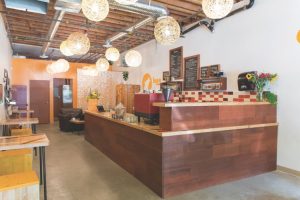
upcycle (verb) : reuse (discarded objects or material) in such a way as to create a product of a higher quality or value than the original.
Basic Design is Vancouver based social enterprise that produces furniture, as well as other products, out of second-hand materials. With extreme consumerism threatening to destroy many of the earth’s finite resources, businesses like Basic Design are focused on increasing ‘conscious consumerism’, specifically by using upcycled materials to create artistic and useful products that are built to last. A big opportunity arose in Vancouver when “the Green Demolition Bylaw required certain homes built before 1940 to have 70 to 90 per cent of the waste produced during demolition diverted from landfills.” This allows companies like Basic Design to source their materials from waste that would otherwise be going to the landfill. With an ever-increasing shift towards sustainability, this is differentiation point for Basic Design in comparison to classic furniture companies in Vancouver. Other businesses, like Lupii Community Café are leaning towards zero waste practices, giving Basic Design the opportunity to furnish full retail spaces with their designs. To me, this is a perfect example of the opportunities of sustainable design and consumption that we will probably see in increasing amounts in the next few decades. It’s also a great example of how governments can get involved in inspiring or at least encouraging sustainable business practices. Cities like Vancouver should be enacting more bylaws to require this type of sustainable waste practices. Why is it that only some homes built before 1940 are being required to have their materials diverted from landfills? Many of those homes have now become heritage homes, preventing their destruction, and limiting the amount of inputs for Basic Design. Nonetheless, this concept of upcycling materials to limit waste could be put into effect in other industries. For example, the clothing industry, the second ‘dirtiest’ industry in the world, could make use of this upcycling, whether through producing fibres from plastic bottles, or simply repurposing old clothing (ie. vintage clothing). Overall, the opportunities of upcycling are endless.
Article and Photo: https://www.biv.com/article/2017/2/making-business-case-upcycling/
The up-cycling movement is certainly gaining traction as vintage styles are coming back into trend. In many cases, one’s wardrobe today may not be vastly different in terms of style as say, your parents’. Furthermore, as the tiny house and #vanlife movement is booming, many people are outfitting the interior of these homes with repurposed and up-cycled materials, as they add a rustic, homey feel. It also reduces cost which is a massive bonus! Old palates are being turned into beautiful furniture here in Vancouver: https://woodshop.coop
Wow, those Wood Shop designs are super cool!
Thanks for sharing Carlene – I had no idea that ‘Basic Design’ was an actual social enterprise. When reading your post, I was immediately reminded of a discussion we had in class today about the different iterations of “sustainability”: 1) Version 1 – Reducing negative externalities and 2) Version 2 – Focus on innovation as it pertains to sustainability. The business model adopted by ‘Basic Design’ definitely reminds me of the second version – developing creative and innovative solutions to sustainability issues faced by more than one industry.